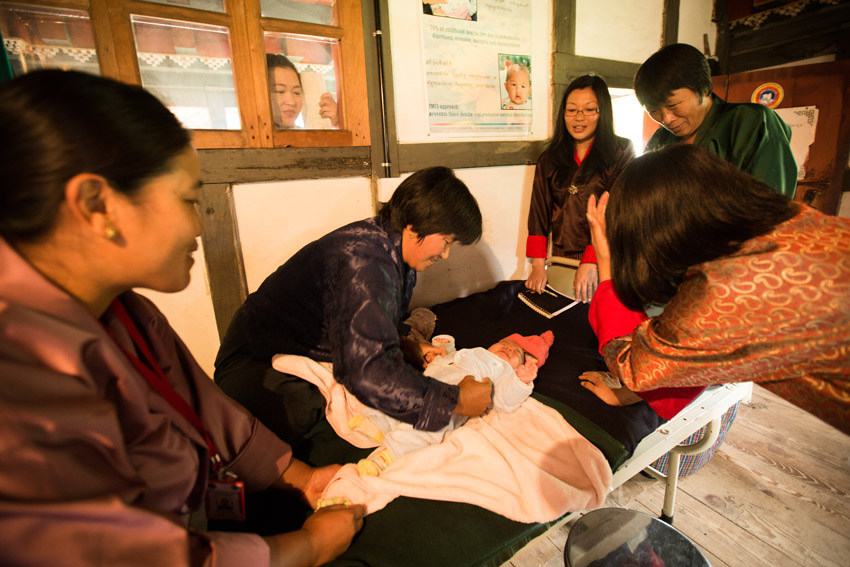 Reducing Maternal Mortality and Making Motherhood Safer
Partnership between Thailand and its neighboring countries in improving maternal health.
Reducing Maternal Mortality and Making Motherhood Safer
Partnership between Thailand and its neighboring countries in improving maternal health.

Challenges
Thailand’s success with maternal health care allowed the country to share and exchange its experiences with other countries, especially those that face a high rate of maternal mortality, to help reduce preventable causes of deaths. In many Asian countries, maternal mortality was high. Bhutanese women died of pregnancy-related causes, particularly in rural and remote areas where there was a lack of services. Similarly, in the Lao People’s Democratic Republic, maternal mortality was attributed to a low percentage of births attended by skilled health service providers, including limited access to emergency obstetric and newborn care. Through the facilitation of the United Nations Population Fund (UNFPA), Thailand’s knowledge and skills on maternal health care were tapped and shared with Bhutan and the Lao People’s Democratic Republic to increase capacities of health personnel providing maternal health services in those countries.
Towards a Solution
Cooperation initiatives between Thailand and Bhutan and between Thailand and the Lao People’s Democratic Republic were launched under the South-South cooperation framework. A comprehensive and in-depth needs assessment as well as contextual situation analysis of the respective countries were carried out. Findings from the assessment and discussions with key stakeholders defined the scope and strategies for collaboration.
Drawing from both Thailand’s expertise and UNFPA’s vast network, several initiatives were undertaken that included exchange and learning visits, and development of a training curricula for health care personnel, including courses for midwives and lectures and workshops on safe motherhood.
Results
Both Bhutanese and Lao health care personnel, as well as policy makers, gained knowledge and understanding of Thailand’s successful experience in providing maternal health care services through a cadre of highly-skilled birth attendants, involvement of community and health volunteers in maternal health programmes and an operational health management system that included protocol, guidelines and a comprehensive health referral system.
Based on the outcome of the joint initiative, Bhutan allocated more resources towards its maternal health programme. As a result, nine regional health and 50 key health personnel from basic health units as well as referral hospitals located in remote areas were equipped with advanced midwifery and emergency obstetric skills. Each of the trained health personnel provided maternal health services and care to around 20-50 cases a month.
In the Lao People’s Democratic Republic, 52 trained administrators and midwifery instructors, including teachers and preceptors, transferred knowledge and experiences that produced at least 300 trained midwives per year with 90 per cent of the trained midwives placed at health centres and hospitals throughout the country.
Lessons Learned
Considering that multiple actors and partners are often involved in cross-country cooperation, it is imperative that roles and responsibilities are identified, discussed and agreed at the outset and that they are adhered to by all parties concerned. Transparency is important to foster trust and long-lasting partnerships.
Contact Information
Countries involved
Supported by
Implementing Entities
Project Status
Project Period
Primary SDG
Secondary SDGs
Similar Solutions
| NAME OF SOLUTION | Countries | SDG | Project Status | |
|---|---|---|---|---|
A Billion Brains: Smarter Children, Healthier Economies High Level Meeting on South-South Cooperation for Child Rights |
Bhutan, Lao People’s Democratic Republic, Thailand | 17 - Partnerships for the Goals | Completed | View Details |
Accelerating the Implementation of African Union Treaties in São Tomé and Príncipe South-South learning from the Beninese judicial system’s experience in the application of human rights treaties to its national law |
Bhutan, Lao People’s Democratic Republic, Thailand | 05 - Gender Equality | Completed | View Details |
Accelerating the Transformational Shift to a Low-Carbon Economy in Mauritius Towards supplying 35 percent of the country’s energy needs with renewables by 2025 |
Bhutan, Lao People’s Democratic Republic, Thailand | 05 - Gender Equality 09 - Industry, Innovation and Infrastructure 13 - Climate Action | Ongoing | View Details |
Accelerator Labs Network Following collective intelligence methods to address emerging sustainability challenges and the growing demand for local solutions |
Bhutan, Lao People’s Democratic Republic, Thailand | 08 - Decent Work and Economic Growth 13 - Climate Action | Ongoing | View Details |
Access to Justice through e-Services and Dematerialized Case Management Scaling up connectivity and unlocking the digital potential of judicial institutions to enhance access to justice for all |
Bhutan, Lao People’s Democratic Republic, Thailand | 05 - Gender Equality | Completed | View Details |
